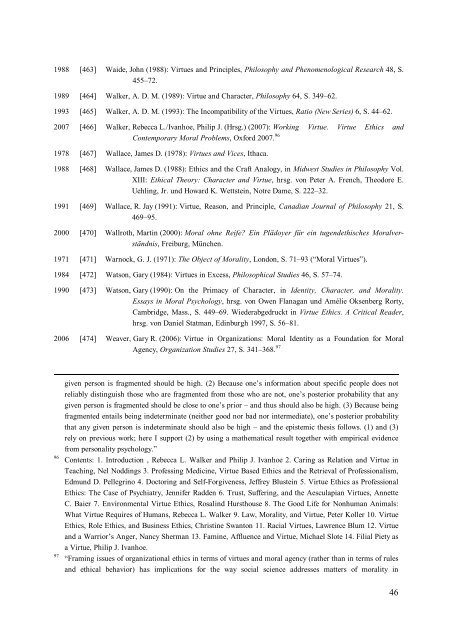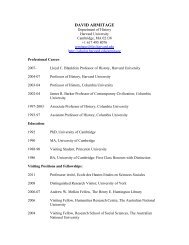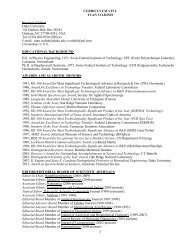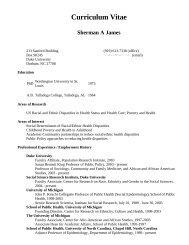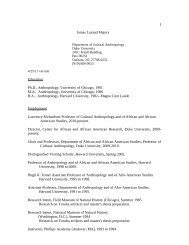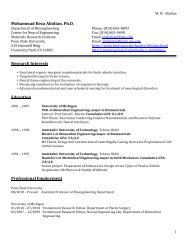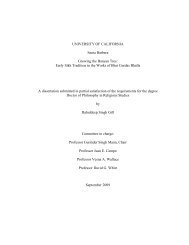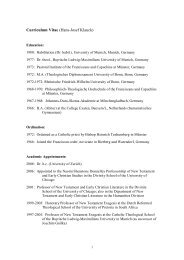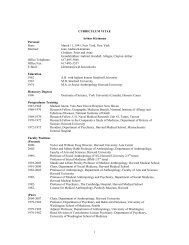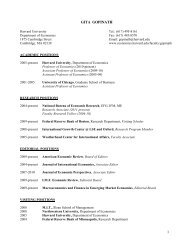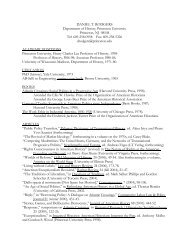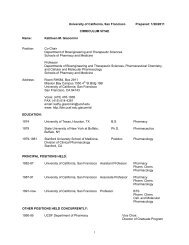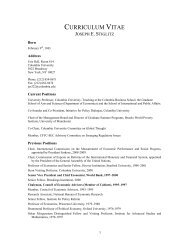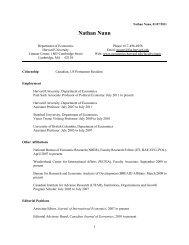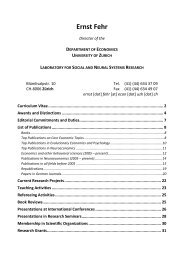1988 [463] Waide, John (1988): <strong>Virtue</strong>s and Principles, Philosophy and Phenomenological Research 48, S.455–72.1989 [464] Walker, A. D. M. (1989): <strong>Virtue</strong> and Character, Philosophy 64, S. 349–62.1993 [465] Walker, A. D. M. (1993): The Incompatibility of the <strong>Virtue</strong>s, Ratio (New Series) 6, S. 44–62.2007 [466] Walker, Rebecca L./Ivanhoe, Philip J. (Hrsg.) (2007): Working <strong>Virtue</strong>. <strong>Virtue</strong> Ethics andC<strong>on</strong>temporary Moral Problems, Oxford 2007. 961978 [467] Wallace, James D. (1978): <strong>Virtue</strong>s and Vices, Ithaca.1988 [468] Wallace, James D. (1988): Ethics and the Craft Analogy, in Midwest Studies in Philosophy Vol.XIII: Ethical Theory: Character and <strong>Virtue</strong>, hrsg. v<strong>on</strong> Peter A. French, Theodore E.Uehling, Jr. und Howard K. Wettstein, Notre Dame, S. 222–32.1991 [469] Wallace, R. Jay (1991): <strong>Virtue</strong>, Reas<strong>on</strong>, and Principle, Canadian Journal of Philosophy 21, S.469–95.2000 [470] Wallroth, Martin (2000): Moral ohne Reife? Ein Plädoyer für ein tugendethisches Moralverständnis,Freiburg, München.1971 [471] Warnock, G. J. (1971): The Object of Morality, L<strong>on</strong>d<strong>on</strong>, S. 71–93 (“Moral <strong>Virtue</strong>s”).1984 [472] Wats<strong>on</strong>, Gary (1984): <strong>Virtue</strong>s in Excess, Philosophical Studies 46, S. 57–74.1990 [473] Wats<strong>on</strong>, Gary (1990): On the Primacy of Character, in Identity, Character, and Morality.Essays in Moral Psychology, hrsg. v<strong>on</strong> Owen Flanagan und Amélie Oksenberg Rorty,Cambridge, Mass., S. 449–69. Wiederabgedruckt in <strong>Virtue</strong> Ethics. A Critical Reader,hrsg. v<strong>on</strong> Daniel Statman, Edinburgh 1997, S. 56–81.2006 [474] Weaver, Gary R. (2006): <strong>Virtue</strong> in Organizati<strong>on</strong>s: Moral Identity as a Foundati<strong>on</strong> for MoralAgency, Organizati<strong>on</strong> Studies 27, S. 341–368. 979697given pers<strong>on</strong> is fragmented should be high. (2) Because <strong>on</strong>e’s informati<strong>on</strong> about specific people does notreliably distinguish those who are fragmented from those who are not, <strong>on</strong>e’s posterior probability that anygiven pers<strong>on</strong> is fragmented should be close to <strong>on</strong>e’s prior – and thus should also be high. (3) Because beingfragmented entails being indeterminate (neither good nor bad nor intermediate), <strong>on</strong>e’s posterior probabilitythat any given pers<strong>on</strong> is indeterminate should also be high – and the epistemic thesis follows. (1) and (3)rely <strong>on</strong> previous work; here I support (2) by using a mathematical result together with empirical evidencefrom pers<strong>on</strong>ality psychology.”C<strong>on</strong>tents: 1. Introducti<strong>on</strong> , Rebecca L. Walker and Philip J. Ivanhoe 2. Caring as Relati<strong>on</strong> and <strong>Virtue</strong> inTeaching, Nel Noddings 3. Professing Medicine, <strong>Virtue</strong> Based Ethics and the Retrieval of Professi<strong>on</strong>alism,Edmund D. Pellegrino 4. Doctoring and Self-Forgiveness, Jeffrey Blustein 5. <strong>Virtue</strong> Ethics as Professi<strong>on</strong>alEthics: The Case of Psychiatry, Jennifer Radden 6. Trust, Suffering, and the Aesculapian <strong>Virtue</strong>s, AnnetteC. Baier 7. Envir<strong>on</strong>mental <strong>Virtue</strong> Ethics, Rosalind Hursthouse 8. The Good Life for N<strong>on</strong>human Animals:What <strong>Virtue</strong> Requires of Humans, Rebecca L. Walker 9. Law, Morality, and <strong>Virtue</strong>, Peter Koller 10. <strong>Virtue</strong>Ethics, Role Ethics, and Business Ethics, Christine Swant<strong>on</strong> 11. Racial <strong>Virtue</strong>s, Lawrence Blum 12. <strong>Virtue</strong>and a Warrior’s Anger, Nancy Sherman 13. Famine, Affluence and <strong>Virtue</strong>, Michael Slote 14. Filial Piety asa <strong>Virtue</strong>, Philip J. Ivanhoe.“Framing issues of organizati<strong>on</strong>al ethics in terms of virtues and moral agency (rather than in terms of rulesand ethical behavior) has implicati<strong>on</strong>s for the way social science addresses matters of morality in46
2006 [475] Webber, J<strong>on</strong>athan (2006): Character, C<strong>on</strong>sistency, and Classificati<strong>on</strong>, Mind 115, S. 651–58. 98 –Zu [399]. Dazu: [400].2006 [476] Webber, J<strong>on</strong>athan (2006): <strong>Virtue</strong>, Character and Situati<strong>on</strong>, Journal of Moral Philosophy 3, S.193–213. 99 – Zu [118].2007 [477] Webber, J<strong>on</strong>athan (2007): Character, Comm<strong>on</strong>-Sense, and Expertise, Ethical Theory and MoralPractice 10, S. 89–104. 100organizati<strong>on</strong>s. In particular, attending to matters of virtue and moral agency directs attenti<strong>on</strong> to the moralidentity, or self-c<strong>on</strong>cept, of pers<strong>on</strong>s, and to the circumstances that influence self-identity. This articledevelops parallels between philosophical theories of virtue and the c<strong>on</strong>cept of moral identity as developed insocial cognitive identity theory. Explicating noti<strong>on</strong>s of virtue and moral agency in terms of social cognitiveidentity theory, in turn, helps direct attenti<strong>on</strong> to a range of factors – including both organizati<strong>on</strong>al andextraorganizati<strong>on</strong>al, macro-cultural <strong>on</strong>es – that can foster or inhibit moral agency in organizati<strong>on</strong>s.”98“John Doris has recently argued that since we do not possess character traits as traditi<strong>on</strong>ally c<strong>on</strong>ceived,virtue ethics is rooted in a false empirical presuppositi<strong>on</strong>. Gopal Sreenivasan has claimed, in a paper inMind, that Doris has not provided suitable evidence for his empirical claim. But the experiment Sreenivasanfocuses <strong>on</strong> is not <strong>on</strong>e that Doris employs, and neither is it relevantly similar in structure. The c<strong>on</strong>fusi<strong>on</strong>arises because both authors use the phrase ‘cross-situati<strong>on</strong>al c<strong>on</strong>sistency’ to describe the aspect of charactertraits that they are c<strong>on</strong>cerned with, but neither defines this phrase, and it is ambiguous: Doris uses it in <strong>on</strong>esense, Sreenivasan in another. Partly for this reas<strong>on</strong>, the objecti<strong>on</strong>s Sreenivasan raises fail to block theargument Doris provides. In particular, the most reliable data Doris employs, Milgram’s famous study ofauthority, is entirely immune to Sreenivasan’s objecti<strong>on</strong>s. Sreenivasan has not shown, therefore, that Dorisprovides unsuitable evidence for his claim.”99“Philosophers have recently argued that traditi<strong>on</strong>al discussi<strong>on</strong>s of virtue and character presuppose anaccount of behaviour that experimental psychology has shown to be false. Behaviour does not issue fromglobal traits such as prudence, temperance, courage or fairness, they claim, but from local traits such assailing-in-rough-weather-with-friends-courage and office-party-temperance. The data employed providesevidence for this view <strong>on</strong>ly if we understand it in the light of a behaviourist c<strong>on</strong>strual of traits in terms ofstimulus and resp<strong>on</strong>se, rather than in the light of the more traditi<strong>on</strong>al c<strong>on</strong>strual in terms of inner eventssuch as inclinati<strong>on</strong>s. More recent experiments have shown this traditi<strong>on</strong>al c<strong>on</strong>cepti<strong>on</strong> to have greaterexplanatory and predictive power than its behaviourist rival. So we should retain the traditi<strong>on</strong>al c<strong>on</strong>cepti<strong>on</strong>,and hence reject the proposed alterati<strong>on</strong> to our understanding of behaviour. This discussi<strong>on</strong> has furtherimplicati<strong>on</strong>s for future philosophical investigati<strong>on</strong>s of character and virtue.”100 “Gilbert Harman has argued that the comm<strong>on</strong>-sense characterological psychology employed in virtue ethicsis rooted not in unbiased observati<strong>on</strong> of close acquaintances, but rather in the ‘fundamental attributi<strong>on</strong>error’. If this is right, then philosophers cannot rely <strong>on</strong> their intuiti<strong>on</strong>s for insight into characterologicalpsychology, and it might even be that there is no such thing as character. This supports the idea, urged byJohn Doris and Stephen Stich, that we should rely exclusively <strong>on</strong> experimental psychology for ourexplanati<strong>on</strong>s of behaviour. The purported ‘fundamental attributi<strong>on</strong> error’ cannot play the explanatory rolerequired of it, however, and anyway there is no experimental evidence that we make such an error. It is truethat trait-attributi<strong>on</strong> often goes wr<strong>on</strong>g, but this is best explained by a set of difficulties that beset theexplanati<strong>on</strong> of other people’s behaviour, difficulties that become less acute the better we know the agent.This explanati<strong>on</strong> allows that we can gain genuine insight into character <strong>on</strong> the basis of our intuiti<strong>on</strong>s,though claims about the actual distributi<strong>on</strong> of particular traits and the correlati<strong>on</strong>s between them must bebased <strong>on</strong> more objective data.”47
- Page 1: Literatur
- Page 4 and 5: national Journal of Management Revi
- Page 6: 53.2010 [39] Battaly, Heather (2010
- Page 9 and 10: 2005 [60] Brady, Michael S. (2005):
- Page 11 and 12: 2008 [72] Calhoun, Cheshire (2008):
- Page 13 and 14: 1998 [93] Cooper, John M. (1998): T
- Page 15 and 16: 2005 [120] Doris, John M. (2005): R
- Page 17 and 18: 1978 [138] Foot, Philippa (1978): V
- Page 19 and 20: 1996 [166] Griffin, James (1996): V
- Page 21 and 22: 166-84.1996 [188] Hooker, Brad (199
- Page 23 and 24: Theory and Moral Practice 8, S. 387
- Page 25 and 26: Ethics, hrsg. von Patricia H. Werha
- Page 27 and 28: Deutsche Zeitschrift für Philosoph
- Page 29 and 30: 2009 [280] Miller, Christian (2009)
- Page 31 and 32: 2000 [299] Oderberg, David S. (2000
- Page 33 and 34: Moral Education 24, S. 175-184.1997
- Page 35 and 36: Southern Journal of Philosophy 14,
- Page 37 and 38: 1997 [379] Slote, Michael (1997): V
- Page 39 and 40: 2009 [401] Sreenivasan, Gopal (2009
- Page 41 and 42: 2010 [416] Stohr, Karen E. (2010):
- Page 43 and 44: 2008 [441] Tessman, Lisa (2008): Re
- Page 45: 2009 [457] van Zyl, Liezl (2009): A
- Page 49 and 50: 2008 [484] White, Richard (2008): R


